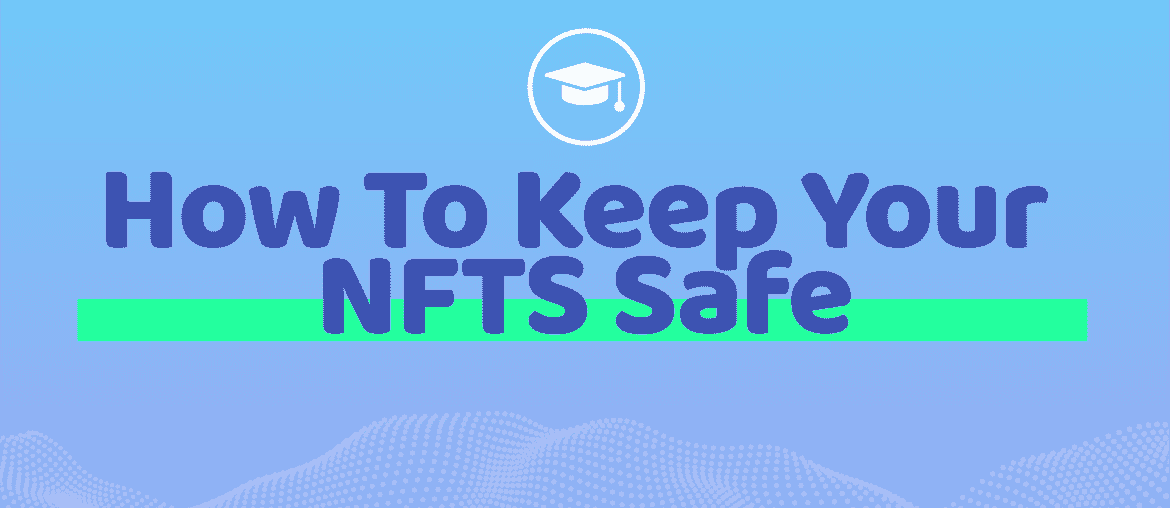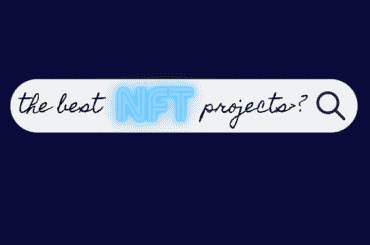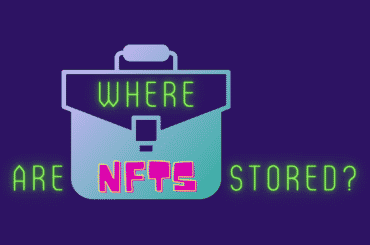If you have recently gotten into the NFT marketplace, chances are you have a lot of questions and confusion. Thankfully, you’ve come to the right place. With unique terms and a structure completely different from the traditional methods of investing, saving, and acquiring assets, the strange world of cryptocurrency can be a tough one to navigate when you are just starting out, especially.
One of the most crucial parts of navigation is to be sure you are doing so safely. The security and welfare of yourself, not to mention your assets, is one of the most important things you can research. Without security and safety, you stand to lose your assets or expose your personal information.
Table of Contents
What Is an NFT?
Known as a non-fungible token, an NFT is one of the most popular ways to trade, buy, and sell on the crypto marketplace. An NFT is, in its simplest terms, a token that represents something else. Most often, these are digital files, which can range in the realm of artwork anywhere from a .gif or tweet, to a .jpg, .mp3, or .mp4 file.
The second major feature of the NFT is the “non-fungible” portion, which means that it cannot be directly traded for another of its kind. Non-fungible tokens are those with no equal. There is nothing that can be a perfectly matched value or be a replacement.
Blockchain Technology
NFTs are made possible by the blockchain network on which they exist. The first level of NFT security comes from this technology.
The blockchain is a distributed, decentralized ledger of sorts. It keeps track of the transactions of the crypto’s comings and goings. Blocks are created when a miner or those that solve the puzzles are keeping the data safely stored. These blocks are linked, just like a real chain, to one another.
Everyone on the network has access to this ledger, which means anyone can view these transactions. These blocks can verify ownership, record a transaction, and make those things “set in stone,” so to speak.
The science behind the blockchain is the first line of defense, keeping your digital asset collection secure. By decentralizing the ledger, there is a security in a peer-to-peer safeguard. Without a central authority, such as a bank or a governmental entity, the network is kept safe by those verifying the data.
Choosing an NFT Marketplace
The online space where NFTs are created (known as “minting”), bought, sold, traded, and valued all happens within the NFT Marketplace. There is no one, individual marketplace, rather, there are several.
Most steps in securing your own NFT collection will require you to make choices in the products, software, and hardware that are available out there. With a vast worldwide web, there are plenty of options to choose from, and making the choice that is best for you requires research.
What Are Your Goals?
Before selecting your NFT marketplaces of choice, it is wise to outline what you aim to do with your adventures in NFTs. Are you seeking to strictly enjoy a wide variety of digital art? Are you going to get into serious investments? Are you worried about gas fees and costs to get started? Or are you looking for long-term options for creating digital asset collections?
Some that are diving in are creators. Others are traders. Still more are strictly buying and selling, trying to earn a profit. Whatever your goals, which marketplace you may want to focus on depends on those prerogatives.
NFT Market Research
There is a major market out there, and it is constantly growing and changing. New products are coming out, faster than researchers can even catch up to them, but staying informed of these options is another crucial step in keeping your NFTs secure.
Doing your due diligence will not only help you find the products that will work best for you but also ensure that you are working with safe, proven platforms. With a market that is constantly coming out with new start-ups, it is best to be sure the technology is keeping you, your data, and your digital assets secure with trusted methods.
A Digital Wallet
Once you have an idea of your goals in the digital marketplace, and what sites may best serve your needs, it is important to take one of the first steps of action in the crypto space: obtaining a digital wallet.
A digital wallet is a space in which you store your cryptocurrency. No matter what form it takes, such as NFTs, fungible tokens, coins, badges, or stable coins, these digital assets must be held in an account. These accounts make it possible to interact on the marketplace platforms.
A digital wallet is a way in which you keep your NFTs (and other cryptos) safe. Making this choice and finding the best, most secure storage option for you will mean the difference between a locked-down NFT wallet and a risky loss of your personal information.
Hold Onto Your Keys
No matter which you choose, you will need a digital wallet. A wallet holds your passcodes. These private keys are what you will use to access your crypto. The importance is to firstly keep these keys safe, but secondly to ensure they are not forgotten.
Plenty of fortunes have been lost or frozen because users forgot their own passcodes. It sounds absurd, but without these often lengthy and complicated keys, you cannot access your own crypto.
While it is called a wallet, to compare it to the “real world” version of something that holds money, it behaves more like a keychain on which you hold your house, car, or business keys. Without these keys, just like in the real world, you cannot get into your house, start your car, or open for business.
The same is true in the cryptocurrency space. Without your keys, your digital assets are not only at risk but can be lost into the abyss, blocking even you from accessing them in any way.
Types of Digital Wallets
Just like options in the NFT marketplaces and platforms you use, you also have a plethora of options when it comes to selecting a digital wallet. Crypto wallets (a term used interchangeably with digital wallets or blockchain wallets) are what keep your NFTs (and any other forms of cryptocurrency) safe. Picking the right method for you is as personalized as your goals for entering the marketplace.
To start, you will want to select the style of digital wallet that suits your needs best. There are three main types of digital wallets: a hardware wallet, a software wallet, and a paper wallet.
Hardware Wallets
Much like a removable hard drive for extra storage space, hardware wallets are a device that is connected to your computer, typically via a USB cord. This device is able to be removed, making sure it is not out there floating on the worldwide web.
Benefits of a Hardware Wallet
Without being connected to a computer, hardware wallets can be safely stored in your own home. It is not something that exists in the open world of the Internet but is instead stored on a tactile, real-world item.
You can physically transport the wallet. You can keep it where you please. You have total control.
Cold Storage Hardware Wallet
This device is often referred to as a cold storage hardware wallet. The keys are held only by the owner, and you are responsible for them. Since your data and therefore digital crypto assets are not online in any way, the term is dubbed “cold storage.” They are not out in circulation, but rather put in a “deep freeze” state, away from daily use when you are not online and plugged in with your hardware wallet.
Warnings of a Hardware Wallet
A key component to remember when selecting hardware wallets is that much of the responsibility of security is on you.
REMEMBER A LOG-IN
While the hardware wallet option comes with many perks, there is a risk depending on how trustworthy you find yourself. When handling a hardware wallet, it is up to you to keep the passcodes for entry safe. You can choose different methods for this option, but it will be up to you to be able to access them.
KEEP THE DEVICE SECURE
Additionally, you need to keep your device secure. If you are constantly traveling or transporting the wallet, it could become as readily accessible as any real-world wallet, meaning it just as easily could be lost or stolen.
With your wallet containing all of your private key access, meaning the entire access to your NFTs and other cryptos, it is crucial to keep the access to it or the devices holding keys just as secure. If you don’t feel that you can be responsible for safeguarding the physical device, it is possibly not the option for you.
LIMITED MOBILITY
Without online retrieval of keys, you are also unable to access your private key remotely. If you are constantly on the go or in need of transportability, this may not be the option that best suits you.
Software Wallets
Another option for keeping your NFTs safe within a digital wallet is to select a software wallet. These software choices come in three main forms: web-based, desktop, and mobile.
Web-Based Software Wallets
A web-based software wallet is just as it sounds. It is one that “lives” on the web. It is typically operated by the platform on which you are making your crypto transactions. You are, in this option, however, entrusting the care and oversight of your security to a third party.
On a web-based software wallet, also known as online wallet, you are using the site’s software. This form of “hot storage” (meaning it is living on the world wide web) puts you at risk by not only being out there but also being overseen by another entity.
In a crypto world focused on decentralization for security, this can be a red flag for some. Others find it a perk to have another more powerful and watchful eye than their own on their digital assets.
Desktop Wallets
A desktop wallet again is aptly named. Stemming from software that can be downloaded on your desktop or laptop, this is a program that “lives” on your computer. It is almost an intermediary between web-based and mobile platforms.
A LEVEL OF CONTROL
A desktop wallet has the benefits of being secured on your personal device. It is stored on your computer. You have control and access because of that feature.
EXPOSURE TO THE WEB
However, anytime you are connected to the Internet, as most folks are, whether by hardwire or Wi-Fi, you are putting your data at some risk. Because they are designed with the utmost security in mind, there are safeguards of course to keep your digital wallet safe even while on a desk- or laptop.
But, strictly having anything with some access to the worldwide web means there is a marginal risk of hacking or malware exposure. Nearly anything that can connect to the Internet has such a risk.
LACK OF MOBILITY
Depending on the computer to which you load your software, a desktop wallet can be limited in mobility. For example, if you are storing your wallet on the at-home desktop PC, and you are on the go much of the time, it can be difficult to access your private keys.
Loading the wallet onto a laptop does increase mobility, but may come with risk given the nature of the laptop’s portability (could be stolen, lost, or broken), not to mention the laptop’s likely connection to Wi-Fi-based Internet, putting it again at risk for exposure to hackers or malware.
Mobile Wallets
You may not believe it, but the third type of software wallet is also named for its abilities and location. The mobile wallet is stored where it sounds, on a Smartphone or tablet.
PORTABILITY PLUS
These portable devices are an ideal option for the on-the-go traveler. With so much of our world happening each day on these objects, it is not shocking many want to keep their crypto handy, as well.
A tablet or phone is almost always at your side, making for quick access to your crypto wallet, no matter where you are. Given the highly volatile nature of the crypto and NFT marketplaces, it can be wise to have immediate access at all times to your digital assets.
HOT OR COLD OPTIONS
Mobile wallets can also sometimes provide the benefit of having both hot and cold storage options. This brings that “best of both worlds” feature to many who desire choice when it comes to their crypto.
ALWAYS A RISK
As with most options, with additional portability comes additional risk. Having your digital wallet in your pocket or bag at all times is convenient, sure. But it also puts your device at risk again, much like a laptop, to be broken, stolen, or lost.
The risks also increase when a device is out there on the web constantly, allowing for exposure to malware or hackers. A phone or tablet is easier to access and hack than say a hard drive kept in your home safe.
Paper Wallets
While this concept may sound strange at first, many people opt to go “old school” when it comes to storing their personal and private keys. Some hear “paper wallet” and consider it a high-tech option they’ve never yet heard about in the world of crypto.
But, like its software counterparts, this too is just a simply named option: a paper wallet is just that, a physical piece of paper. Whatever type of paper (a notebook, a journal, a scrap, or even a cocktail napkin), some prefer to have their personal information stored the old-fashioned way.
Complete Security
From an online hacking or malware standpoint, this option comes with zero risk. Without “living” on the worldwide web, and instead of being stored in the real world on a piece of paper, this information never sees the Internet.
There is truthfully no way to have this type of wallet stolen through online means. This fact alone makes it a very attractive option to some.
An Ability to Combine
Some opt to use the paper wallet choice in conjunction with another wallet style. For example, if you have a hardware wallet but are worried about keeping your access and log-ins to it secure (even from your forgetful self), it can be wise to use that hardware wallet alongside a paper wallet.
In other words, you can have a hardware wallet, but choose to keep the log-ins to that on paper. This way, you have a backup to your memory, but that backup does not exist on the Internet, only in the real, physical world.
Still a Need for Security
Having your keys on paper is not the only safeguard you should take, however. Because this is still sensitive information and the virtual access to all of your NFTs and other digital assets, it is wise to keep this paper in a safe space, such as a literal, real-world safe or locked cabinet, drawer, or firebox.
Just like any password, you jot down, you want to be sure no other eyes are going to see it. And, while it is safer in your house and not on the web, it is still at a minor risk of being stolen or seen by others if you are careless about its location.
Don’t travel with your paper, or if you must, be sure it is always kept in a secure location. Consider locks for your bags, a safe at your hotel, or secured personal storage options like a portable firebox to keep this paper in a secure space at all times.
Just because an item is not online, it does not mean it is not in need of added security. Treat your paper wallet as you would any of your other physical assets. Being smart with this paper can be a more secure storage option than keeping data online, but again requires effort on your part.
Stay Secure Online
When you are entering the NFT space, it can be concerning to realize the number of risks involved. As with any online venture, acting in a cautious and informed manner is sometimes the best protection you can have. And, this is no different from a goal with your NFT transactions.
There is a standard security level of nearly any NFT platform. With blockchain networks and complicated coding, a marketplace in and of its own design can secure NFTs. However, when it comes to your personal information, especially that of your private keys, it is crucial to select a method in which to store NFTs that suits you best.
Most NFTs have built-in safety measures by their mere existence. Things like ownership verified authenticity, and location on a blockchain are immutable data. There is extra security built into the technology simply by having a decentralized, blockchain ledger.
Do not take risks when it comes to your NFT storage options. You have plenty to choose from, and multiple forms of robust security in the crypto space make it possible to find the fit that is right for you.





